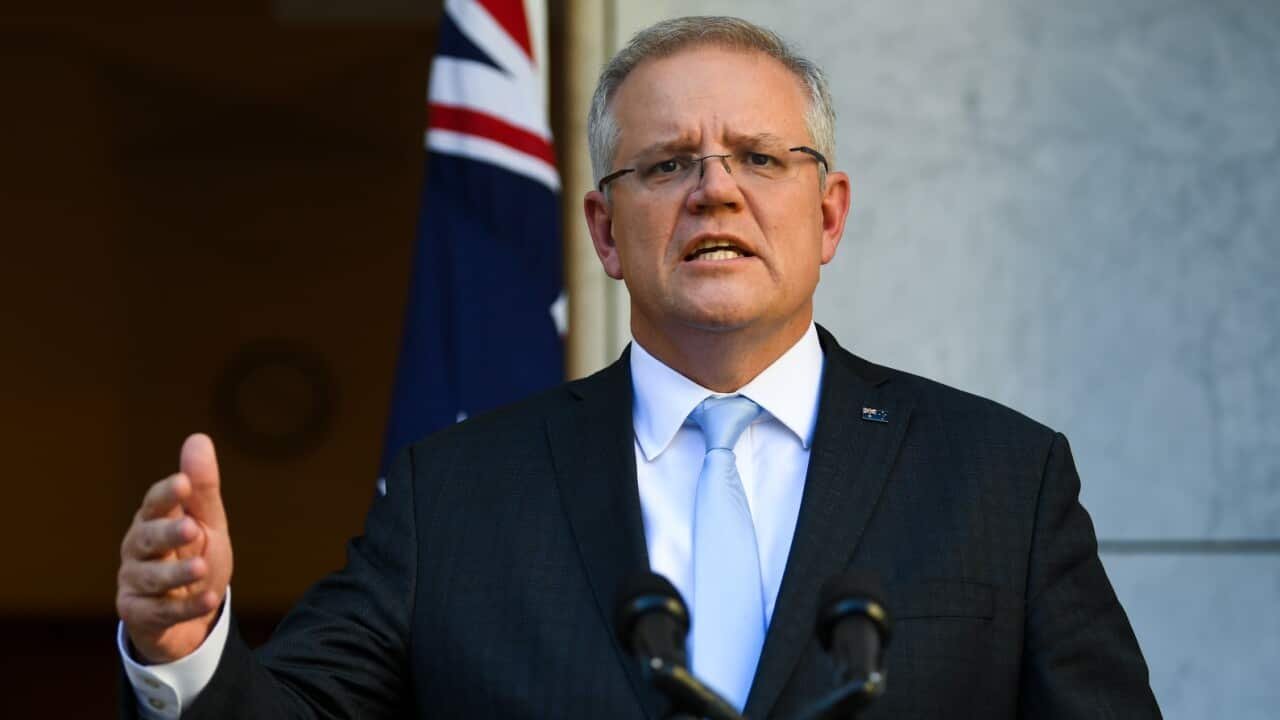Any suggestion that people in NSW can live with the Delta variant has been widely rejected, with Australian Medical Association President Dr Omar Khorshid saying the virus must be eliminated from the community before it can open up again, “otherwise we will see disaster”.
Sydney is grappling with a highly-contagious strain of COVID-19 that saw 38 new local cases of the virus on Thursday, its highest daily caseload of 2021.
Around 10 per cent of cases in the current outbreak have been hospitalised, with 11 people currently in intensive care, three of whom are ventilated.
"There’s no such thing as living with Delta, that is really clear," Dr Khorshid told reporters on Thursday.
Full vaccination is “the only way out”, he said, adding that was not likely to happen until the end of the year.
Prime Minister Scott Morrison on Thursday pledged an additional 300,000 vaccine doses for NSW, in particular residents in southwest Sydney most affected by the current outbreak.
The doses, which will be a mixture of both Pfizer and AstraZeneca jabs, will not come at the expense of other territories, he said.
Dr Khorshid and Mr Morrison both said on Thursday it was not helpful to keep comparing vaccine levels in Australia to those in the US and the UK, where rates are hovering around 65 per cent.
The AMA president said we should look at countries with lower vaccination levels as examples of where Australia could be heading if it doesn’t contain its outbreak.
“We need to look at India or Indonesia to see what the reality will be in Australia if we let this virus rip through the community," he said. The prime minister said he’s aware Australia is falling short of other wealthy countries in terms of its vaccine rollout but said it is “catching up” and every Australian wanting a vaccine will be able to access one by the end of the year.
The prime minister said he’s aware Australia is falling short of other wealthy countries in terms of its vaccine rollout but said it is “catching up” and every Australian wanting a vaccine will be able to access one by the end of the year.

Dr Omar Khorshid says NSW must eliminate COVID-19 before it can open up again. Source: AAP
"We will rocket up those charts in the months ahead,” he told the media in Sydney.
“But Australia still has one of the lowest death rates of COVID. We won the first battle against COVID. Overseas, they lost that battle."
Mr Morrison said it was impossible for Australia to have reached the required level of vaccines that would have enabled Sydney to prevent the current lockdown.
“At no stage, at any time, in the past 12 months, has there been any suggestion we would reach the same level of vaccination as in the UK," he said.
“The suggestion that somehow there was a vaccination rate that would have somehow put us in a different situation than we are right now is simply not true.
“Right now we are catching up.”
Health Minister Greg Hunt has said Australia will receive 2.8 million Pfizer doses in July, 400,000 more than initially expected.
As supplies of the Pfizer vaccine increase and Moderna vaccines become available, Australians under 40 could be eligible for their jabs by October.
At a projected pace of more than one million jabs per day, Mr Morrison says the country is on track to vaccinate every Australian who wants a jab by the end of the year.
Meeting the Christmas target relies on adequate supplies and ongoing motivation - even when the current outbreak in NSW is controlled.
Australia has given more than 8.7 million doses in total, with just over 982,000 of those doses administered in NSW.
This figure compares to more than 1.2 million jabs given in Victoria, nearly 659,000 in Queensland, more than 340,000 in Western Australia and nearly 262,000 in South Australia.
NSW Premier Gladys Berejiklian told reporters on Thursday that NSW will be unable to live with the Delta variant until a significant proportion of the state’s residents are vaccinated.
“There isn't anywhere on the planet that has managed to live with this variant without having a proportion of the population vaccinated,” she said.
The premier has been pushing for 10 million jabs, which amounts to 80 per cent of the adult population or 62 per cent of the NSW population.
After this time, “we can get back to normal”, she said.
“NSW wants to engage with the rest of the world, NSW wants to go back to normal life,” Ms Berejiklian said.
“But that depends on really getting our population, a substantial proportion of our population, vaccinated so we can make sure that the hospitalisation rate and regrettably, in future times, the mortality rate is not beyond what the community expects.”






